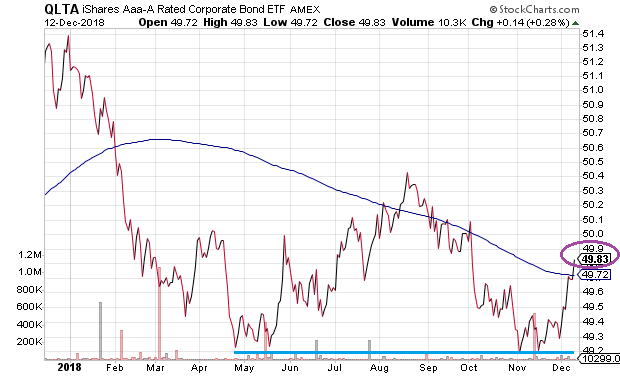The chair of the Federal Reserve is one of the most powerful human beings on the planet. For one thing, he/she exerts an inordinate amount of influence on the cost of capital. Consumers, businesses and governments make critical decisions based on the attractiveness as well as the ability to borrow money.
For another, financial markets hang on both the specific actions as well as the verbal guidance of the Fed chair. Currencies, commodities, bonds, stocks. The movement of each market-based asset is often a function of central bank monetary policy.
Janet Yellen served as the chair of the Federal Reserve last year. And when asked about the possibility of a financial crisis on par with 2008’s systemic breakdown, Ms. Yellen said that she didn’t expect to see one happen “in our lifetimes.” Her reasoning? The financial system had become safer due to several factors, including annual stress testing of banks.
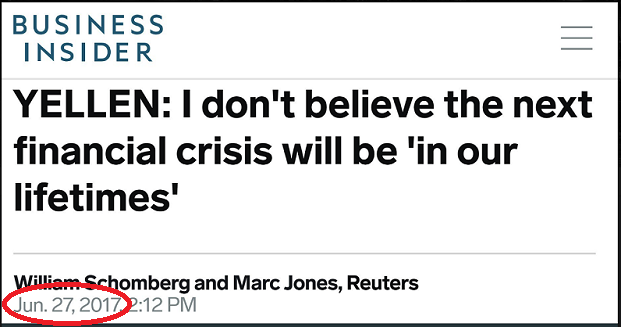
Flash forward from 2017 to 2018. Now Ms. Yellen opines that the Fed does not have the tools to deal with emerging problems. In particular, she is worried about leveraged loans causing catastrophe in global finance.
This is not merely a case of flip-flopping. This borders on the absurd. Either an exceptionally intelligent person was less than truthful last year or the former chair lacked a rudimentary understanding of the explosive growth in leveraged loans, shadow banking and quasi-investment grade rated corporate debt (BBB).
Yellen’s recent comments come on the heels of U.S. bank stocks closing at 15-month lows. As of Tuesday December 11’s close, the SPDR S&P Bank ETF (NYSE:KBE) is down 15% year-to-date. It is down 23% from a high set back in March.
A bear market in bank stocks? Where have we seen that before?
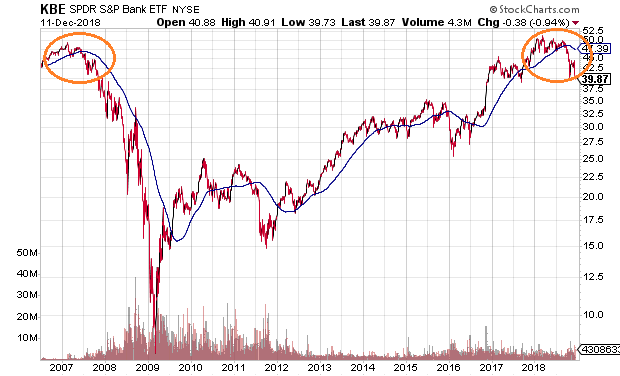
Ironically, banks are supposed to perform well in a strong economy. For that matter, they’re supposed to perform admirably in a rising rate environment.
So what’s the issue? The economy may have peaked and the yield curve is flatter than a martini coaster. Banks cannot borrow at an exceptionally low rate and then lend out at a meaningfully higher one when the yield curve is a straight line.
Keep in mind, higher rates have also decimated loan growth in real estate. There’s virtually no demand for refinancing. What’s more, home sales have fallen in 10 out of the previous 11 months.
Overseas banks? They may be even less reassuring when it comes to the potential for a breakdown. Deutsche Bank (DE:DBKGn) and Credit Suisse (SIX:CSGN) could be signalling that something is amiss.
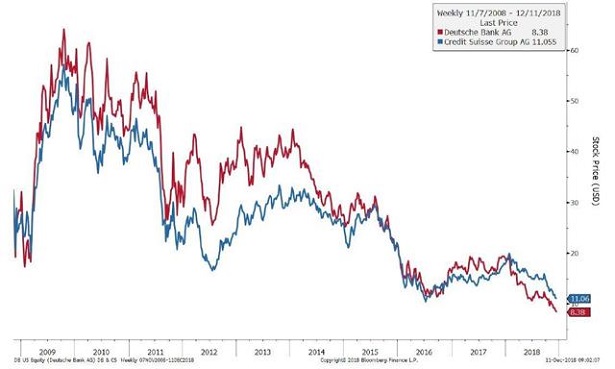
Perhaps Yellen recognizes that she had spoke with a little too much reckless abandon in June of 2017. Or perhaps Yellen was looking to hedge her bets in making recent comments that “walked back” her earlier proclamation.
Regardless, everyone should now understand that the prospects for a near-term financial crisis are very real. Indeed, the current chair of the Federal Reserve and his colleagues put out a report that explicitly warned about a potential crisis related to corporate BBB-rated debt.
Crisis concerns notwithstanding, what is/are the catalyst(s) for the S&P 500 to reclaim former glory above 2931? Some think the combination of genuine progress on the international trade front, coupled with solid Q1 corporate earnings and a “we’re finished hiking” Fed will do the trick. I think that near-term rallies would fail to provide longer-term bullishness.
It is true that U.S. stocks recovered from the 2015-2016 manufacturing recession and global slowdown. At that time, however, the entire world went “all-in” on monetary policy stimulus.
Additionally, the real leg up for U.S. equities did not occur until the promise of tax cuts came alongside the Republican sweep in Congress and Trump’s Q4 election. Stocks had moved up, down and sideways for 22 months prior to the tax-cut excitement.
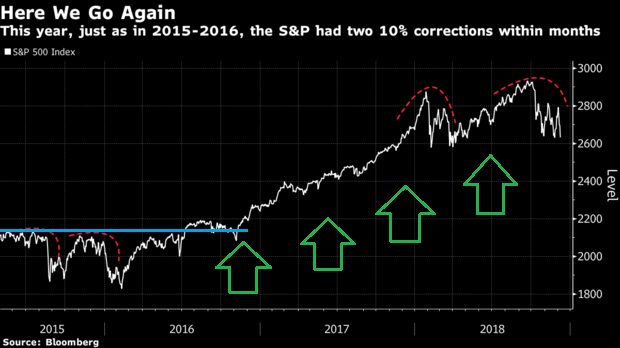
Here in 2018, though, the Fed Funds rate is not a token 0.25%. It is 2%-2.25%, and will likely be 2.25%-2.5% after the Fed meets on December 18. Even if the current group of committee members agree to “pause” on the hiking campaign, and even if they slowed the pace of the quantitative tightening that is responsible for $50 billion monthly reductions in the Fed balance sheet, the cost of capital is much higher today than it was in 2016.
There’s another issue. Back in the 2016 correction, 10-year Treasury yields bottomed out near 1.4%. They were only about 1.7% going into the election later on in November. One supposedly had to own stocks over bonds because bond yields were so darn unappealing. Remember the TINA acronym? “There is no alternative?”
Here in the 2018 correction, a 10-year Treasury peaked near the 3.25% level. Yet even today’s 2.88% 10-year note is far more competitive with stocks than when those notes yielded 1.4% or 1.7%.
I cannot tell you whether or not another financial crisis is around the corner. I can tell you that when banks get beat, overly aggressive risk taking in broader stock indexes is ill-advised.
After all, both Janet Yellen and current Fed chair Jerome Powell see the potential for toxic loans to undermine the global system. If contagion should spread, you might find yourself benefiting from cash equivalents, high-quality (AA and A) corporate bonds as well as stocks of companies with fortress-like balance sheets.
I might opt for individual A-rated corporate debt. Apple (NASDAQ:AAPL) comes to mind.
That said, if the Fed is actually close to the end in its rate raising activity, iShares Aaa – A Rated Corporate Bond ETF (QLTA) could benefit immensely. The 30-day SEC yield of 3.9% isn’t too shabby. Moreover, if the Fed shifts back to easing in 2019 or 2020, one might anticipate price gains as well.
